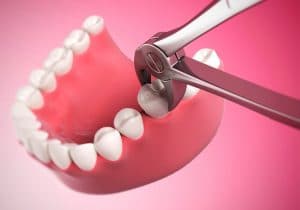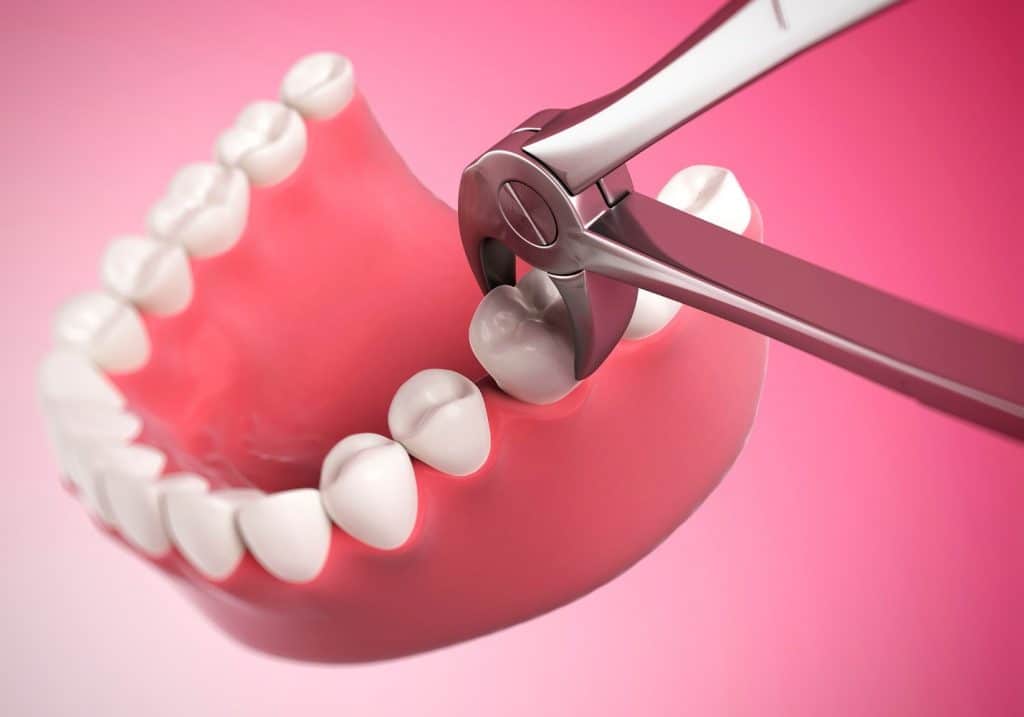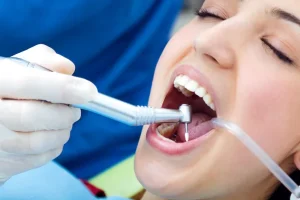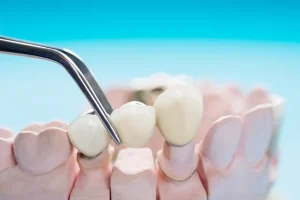Tooth extraction involves the removal of a tooth from the jaw. While your dentist will always strive to save as many natural teeth as possible, there will be situations that warrant the removal of a tooth/teeth. This is undertaken only if it is the only way to preserve oral health and no other alternative will help. Tooth extraction might be anxiety-inducing for some patients, but the procedure is relatively pain-free and comfortable.

Table of Contents
Reasons for tooth extraction
- Large areas of decay in which root canal treatment cannot be done to save the tooth. Progress of decay can cause further complications in the oral cavity. Such teeth are usually extracted.
- Wisdom teeth that haven’t erupted properly, or are stuck within the jaw (impacted). These can cause issues of misalignment, crowding, cavities, and severe pain. Impacted wisdom teeth are also responsible for the infection, inflammation, and gum disease. These have to be removed.
- Cracked or broken teeth that cannot be restored might be recommended for extraction.
- For orthodontic treatment purposes, some teeth may be extracted to create space for alignment.
- In advanced stages of periodontitis (gum disease), teeth may become loose. These need to be extracted to prevent further irritation.
- Hyperdontia is the case when a patient’s permanent teeth start to erupt before their baby teeth have fallen out. To prevent crowding and create space for the permanent dentition, your dentist might extract the baby teeth.
- In cases of rampant infection where teeth can’t be preserved with alternative methods, teeth might be recommended for extraction.
- Patients with compromised immunity (in diseases like HIV/AIDS, or patients undergoing chemotherapy) can have a harder time preventing tooth infection, necessitating tooth extraction.
Tooth Extraction – Preparation
Tooth extractions are relatively common procedures that occur in a dental office. It is an outpatient technique that is done under local anesthesia, and the patient can return home on the same day.
There are two types of extractions –
- Simple Extractions: Removing teeth that are visible in the oral cavity.
- Surgical Extractions: Done in cases of impacted teeth, broken teeth, or teeth that aren’t visible in the oral cavity. These are more invasive.
Before scheduling the extraction, your dentist at Anoka Dental will perform a thorough oral examination. X-rays of your tooth/teeth might be taken to determine its status. They will also ask about any medications you’re on and your medical history. Certain medical conditions like hypertension, diabetes, autoimmune disorders, etc. can impact the outcome of tooth extraction. Medications like bisphosphonates, anti-coagulants, steroids, etc. are also responsible for any issues that might occur during the extraction process. Make sure to inform your dentist of any ailments/medicines you’re taking when you visit them.
Your dentist might also prescribe you antibiotics before the extraction if you’re susceptible to infections.
Tooth Extraction – Procedure
In simple extractions, a local anesthetic is given to numb the area surrounding the tooth that has to be removed. The numbing allows you to feel a little pressure but no pain. Using the surgical and extraction instruments, your dentist will pull out the tooth. A sterile gauze will then be placed on the wound to stop the bleeding till a blood clot is formed.
Simple extractions take hardly a couple of minutes, while surgical extractions take longer. These might also require an oral surgeon.
For surgical extractions, your surgeon might administer an IV anesthetic or nitrous oxide in addition to local anesthesia. These help in keeping the patient calmer and more relaxed. Surgical extractions involve cutting open the gum and also removing a little bit of bone (if necessary) to remove the tooth.
Tooth Extraction – Care
Your dentist will give you post-extraction instructions that you must follow after the procedure. They might also prescribe painkillers for the soreness and any other medication. Recovery usually depends on the type of extraction that has been performed, along with adherence to the instructions.
- Keep your head elevated for 2-3 days after an extraction. Lying flat can cause the blood vessels around the extraction site to throb and pulse, delayed healing.
- At the first sign of swelling, place an ice pack on your jaw. Ice the area for 20 minutes on and 20 minutes off for the first 36 hours.
- Motions like sucking, swishing, and vigorous rinsing can dislodge the blood clot that has been formed. This usually results in a painful condition called ‘dry socket’. Your dentist will ask you to avoid drinking with straws, rinsing your mouth too often, or even spitting.
- 24 hours after the tooth extraction, you will start saltwater rinses. These are done by using warm water mixed with salt and gently swishing around your mouth to keep the extraction site clean.
- You will be asked to follow a soft diet for 2-3 days after the extraction as hard foods can interfere with the healing of the wound.
- Avoid touching the extraction site with your fingers, or tongue.
- Avoid smoking for at least 72 hours after the procedure.
Tooth Extraction – Complications
Although tooth extractions are common procedures, they can cause complications, especially when a patient fails to follow post-extraction instructions.
Dry socket, as mentioned before, is an extremely painful complication of an extraction. This occurs when the blood clot dislodges too early and leaves the underlying nerves and bones exposed. This condition cannot be treated at home and requires immediate professional intervention.
Other complications that can occur after extraction are –
- Bleeding that cannot be controlled, or lasts for more than 12 hours.
- Infections, signaled by a fever and chills.
- Inflammation or redness at the site of infection.
If you feel like you have any of these signs, contact your dentist at Anoka Dental immediately.
Tooth Extraction – Cost
Simple extractions can cost anywhere from $75 – $200 per tooth. This depends on where the tooth is situated and the type of anesthesia you might need.
Surgical extractions are costlier, ranging from $800 – $4000. Where you live also affects the cost of the procedure.
To get an idea of our procedures and rates, get in touch with Anoka Dental today.




